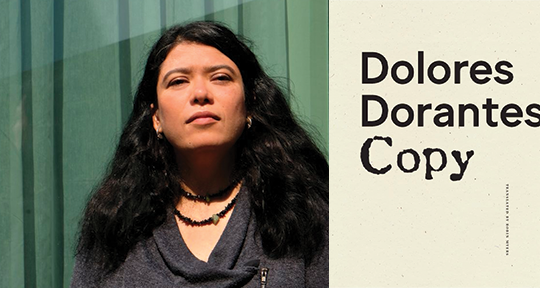Copy by Dolores Dorantes, translated from the Spanish by Robin Myers, Wave Books, 2022
This book is an object, a memento, a testimony, memory, road, destination, vessel, a circle.
Dolores Dorantes’ Copia first came out in the Netherlands as a bilingual (Spanish-Dutch) double-sided booklet titled Copia/Kopie (Publication Studio Rotterdam) in 2018, the result of Dolores’ residency at Poetry International. Three years later, it was released in Spanish under the Mexican press Mangos de Hacha, and in 2022, Copy made its way into English, translated by Robin Myers for Wave Books (US). I’ll start with a mundane statement: Copy’s nomadic nature is the result of opportunity and communion between its author and visionary translators and editors. But after reading it, experiencing it—after crossing its many borders, trying to hold its overwhelming weight, I can’t help but think that Copy’s many editions, shapes, colors, and mediums have also strengthened, confirmed, and laced its themes and motifs: migration, displacement, exile, the loss of one’s place, the loss of one’s address, the loss of one’s identity, movement, uprootedness.
Copy opens with the following line: “It gets fainter and fainter.” Quite the opposite happens. The work is unrelenting, fast-paced, filled with discomfort and existential dread. “You live because you removed yourself from your condition”; “To reassemble oneself. Proactivity, opportunism: an order. A tongue, leaving. A gesture, setting sail: a singular place.” They’re also subtle, violent, proliferate with grotesque imagery: “The soldiers plotted a safe shelter with your blood.” “The tower with its hook-mouth.”
All this to say—Copy is an experience. Dolores invites us to feel, to leave one’s skin. Discomfort, confusion, hurt, relief, and hope are found equally amidst her intricate wording, her syncopated and crushing sentences. Images and interactions emerge, but as flashes, not scenes. They seemed distorted as if one were to peek through a window or a camera lens (the poet, in fact, worked as a journalist in Ciudad Juárez, south of the Río Grande as a young adult). Put together, however, they form a vivid and accurate testimonial. The work is fortified with suspense. “You let the boot of structure advance over you thinking, scornfully: to not be.” It is decorated with absurdity. “Gentlemen, I’m going to ask you to rid yourselves of your sense of pity.” And with imagery that, at times, is devastatingly beautiful. “You live because the moon touched the stone jutting out of the pond to show you, copiously, its edges”; “Just like the petal that peeks a single tip out of the ashes.”

